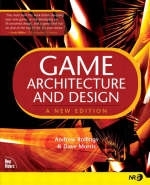
Game Architecture and Design
New Riders Publishing (Verlag)
978-0-7357-1363-5 (ISBN)
- Titel ist leider vergriffen;
keine Neuauflage - Artikel merken
Game Architecture and Design: A New Edition is a revision of the classic that you have been waiting for! This is a detailed guide to game design and planning from first concept to the start of development, including case studies of well known games. Originally published in 1999, Game Architecture and Design, has been updated by the original authors Andrew Rollings and Dave Morris. They tap back into what they teach so well and update this classic with skills and techniques found in the industry today. With more than just re-usable code, it's a comprehensive study that deals specifically with the issues of game design, team building and management, and game architecture. Through the use of real-world experiences and case studies, Andrew and Dave share it all. They show you what's worked and why as well as what to avoid and how to fix any errors. This intelligent and well-argued book is a glimpse into the often-disordered world of game development. Readers will gain solid advice and know-how that can bring some order to the often-chaotic world found in game development.
Andrew Rollings has a B.S. in Physics from Imperial College, London, and Bristol University. He has worked since 1995 as a technical and design consultant spanning many industries. Andrew lives in Auburn, Alabama, and can be contacted at a.rollings@hiive.com. Dave Morris has worked as a designer and creative consultant on PC and console games for several major publishers, most notably Eidos. His strategy game Warrior Kings reached number six in the United Kingdom PC charts. He has done creative development and scriptwriting on television shows for Endemol, Pearson, TV2 Norway, and the BBC. He has also written more than a dozen novels, gamebooks, and movie novelizations, and in 1991 he was the UK's top-selling author. He is currently writing the screenplay for the film version of the classic adventure game The Seventh Guest. Dave lives in London, England, and can be contacted at david.j.morris@dial.pipex.com.
Introduction.
I. GAME DESIGN.
1. First Concept.
The Shock of the New. The Creative Road Map. Having the Idea. Shaping the Idea. The Treatment. Taking Stock. Feasibility. Getting it Down.
2. Core Design.
What Is a Game? Games Aren't Everything. Games Mean Gameplay. Creating the Game Spec. Example Game Spec.
3. Gameplay.
What Is Gameplay? Interactivity.
4. Detailed Design.
The Designer's Role. Design Documentation. Using The Design Documents. Fitting Design to Development. Why Use Documents at All?
5. Game Balance.
Player/Player Balance. Player/Gameplay Balance. Gameplay/Gameplay Balance. A Game Balance Checklist.
6. Look and Feel.
Ambience. Interface. Storytelling. The Sum of the Parts.
7. Wrapping Up.
The Professionals.
8. The Future of Game Design.
The Necessity of Design. Essentials of Game Design. The Future of Design. The Future of Games. Games as Entertainment. The Way Forward.
II. TEAM BUILDING AND MANAGEMENT.
9. Current Methods.
The Current Development Model.
10. Roles and Divisions.
Assigning Personnel. Improving Morale and the Working Environment. Spreading the Risk.
11. The Software Factory.
What Is a Software Factory? Why Use a Software Factory? Organizing a Software Factory. Applying the Software Factory Structure and Methodology. The Suitability of a Software Factory. Smaller Teams. The Final Word.
12. Milestones and Deadlines.
How Milestones Currently Work. Fuzzy Milestones. Milestones and Mini-Milestones. When to Use Milestones. Making Your Milestones Accurate. Defining Milestones.
13. Procedures and “Process”.
Procedures. “Process”. Procedures: Where to Use Them? Source Control and Code Reviews: A Synergy. The Importance of Information Transmission.
14. Troubleshooting.
Risks.
15. The Future of the Industry.
The State of the Industry. The New Model Developers. The Online Revolution.
III. GAME ARCHITECTURE.
16. Current Development Methods.
The History of Development Techniques. The Present Day.
17. Initial Design.
The Beginning. Hardware Abstraction. The Problem Domain. Thinking in Tokens.
18. Use of Technology.
The State of the Art. Blue-Sky Research. Reinventing the Wheel. Use of Object Technology.
19. Building Bricks.
Reusability in Software.
20. Initial Architecture Design.
The Birth of an Architecture. The Tier System. Architecture Design.
21. Development.
The Development Process. Code Quality. Coding Priorities. Debugging and Module Completion. The Seven Golden Gambits. The Three Lead Balloons.
22. The Run-Up to Release.
Late Evaluation. Late Localization. Playtesting. Focus Groups. The Web Site. Getting Ready for the Gold Master. Patches.
23. Postmortem.
Case Study 23.1A Tale of Two Projects. Team Dynamics. Concept. Development. Business Aspects. The Postmortem Postmortem.
24. The Future of Game Development.
Development in Context. Future Development. Small Is Beautiful Too. Building the Team of the Future. New Directions in Development. The Shape of Things to Come?
IV. APPENDIXES.
Appendix A: Sample Game Design Documents.
Detailed Design Discussions. Initial Treatments and Sample Designs. Racketeers: Gang Warfare in the Roaring Twenties. Technical Specifications. Code Review Form. Test Scripts.
Appendix B: Bibliography.
Glossary.
Index.
| Erscheint lt. Verlag | 6.11.2003 |
|---|---|
| Sprache | englisch |
| Maße | 185 x 232 mm |
| Gewicht | 1526 g |
| Themenwelt | Informatik ► Weitere Themen ► Computerspiele |
| ISBN-10 | 0-7357-1363-4 / 0735713634 |
| ISBN-13 | 978-0-7357-1363-5 / 9780735713635 |
| Zustand | Neuware |
| Haben Sie eine Frage zum Produkt? |
aus dem Bereich


